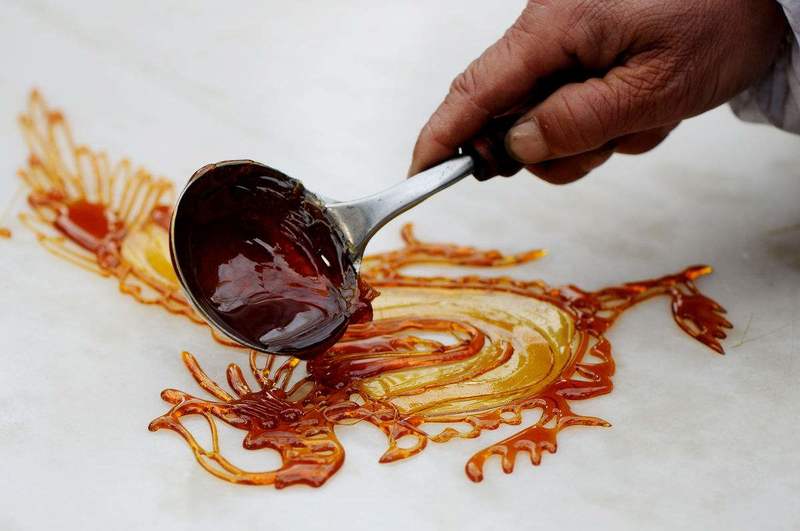Sugar Painting 糖畫
Dublin Core
Title
Sugar Painting 糖畫
Subject
Painting, Drawing, Folk art
Description
Hot liquid sugar is used to make two-dimensional art and solidifies after cooling down.
Creator
Chen Zi'ang (陳子昂)
Date
Ming Dynasty (1368-1644 AD) / Tang Dynasty (618-907 AD)
Format
Flat
Type
Craft
Crafts Item Type Metadata
Crafting Methods
Sugar painting was often done on marble or metal panels.
The process of sugar painting includes four steps, including boiling down syrup, painting on a plane, sticking to a stick, removing from the plane. If a three dimensional figure is created, layers of pre-made two dimensional sugar painting.
Although techniques vary, normally the hot sugar is drizzled from a small ladle onto a flat surface, usually white marble or metal. The outline is produced with a relatively thick stream of sugar. Then, supporting strands of thinner sugar are placed to attach to the outline, and fill in the body of the figure. These supporting strands may be produced with swirls, zig-zags, or other patterns. Finally, when completed, a thin wooden stick, used to hold the figure, is attached in two or more places with more sugar. Then, while still warm and pliable, the figure is removed from the surface using a spatula-like tool, and is sold to the waiting customer, or placed on display.
The process of sugar painting includes four steps, including boiling down syrup, painting on a plane, sticking to a stick, removing from the plane. If a three dimensional figure is created, layers of pre-made two dimensional sugar painting.
Although techniques vary, normally the hot sugar is drizzled from a small ladle onto a flat surface, usually white marble or metal. The outline is produced with a relatively thick stream of sugar. Then, supporting strands of thinner sugar are placed to attach to the outline, and fill in the body of the figure. These supporting strands may be produced with swirls, zig-zags, or other patterns. Finally, when completed, a thin wooden stick, used to hold the figure, is attached in two or more places with more sugar. Then, while still warm and pliable, the figure is removed from the surface using a spatula-like tool, and is sold to the waiting customer, or placed on display.
Materials
Sugar candy
Usage and Application
It is a form of decoration and snack.
Interesting Facts
Some say Chen Zi'ang is the creator of it. He loved to eat brown sugar, but he liked to eat it in a unique way that he can both appreciate like an artwork and enjoy like sweets. So he melted the sugar and casted the sugar into molds to form its shape. One day, as he was holding the sugar casting on his hand, the prince passed by and saw it. He asked for it and took it away. After he got back, the emperor saw it and thought of it as an interesting invention. He complimented Chen Zi'ang and gives it a name, “sugar pancake”. So it became a snack popular in the court. After he left the palace, he spread this technique in his hometown, located in modern Sichuan province. Because of the emperor's compliment, this form of art and food became popular quickly and developed as the sugar painting nowadays.
Collection
Citation
Chen Zi'ang (陳子昂), “Sugar Painting 糖畫,” CCCH9051 Group 64, accessed February 20, 2026, https://learning.hku.hk/ccch9051/group-64/items/show/4.

